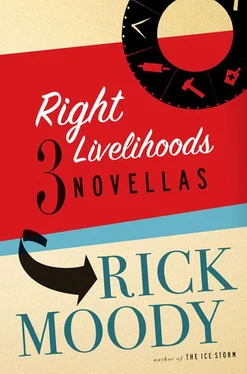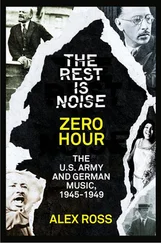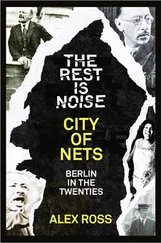“Uh, actually, the viola is under the bed.”
“Oh, that’s too bad.”
“Well. . ”
“But you’re still trying to write music?”
“Not really. I guess I’m—”
“What are you doing, then?”
“I’m in pharmaceutical sales.”
It hadn’t occurred to her before that he could be some kind of Eric impostor. His voice was similar but maybe a little huskier and flatter, with fewer nasal resonances. The voice of Eric if he’d put on forty pounds. The thought disturbed her.
“Have you been smoking?”
“Not that I know of, Ellie.”
“What does that mean?”
“It means I haven’t been smoking at all. But why do you ask?”
“Your voice sounds different.”
“Maybe when you haven’t talked to someone in eleven or twelve years—”
“I’m going to ask you some questions that only Eric could answer, okay?”
“Ellie, are you—”
“What color was the sweater I bought you?”
“I don’t remember any sweater that you bought me.”
“That’s correct. And what was my favorite brand of cigarettes?”
“Ellie, we’re not going to do this.”
“Eric, if we don’t I’ll start worrying.”
“You’re sounding a little distraught to me, Ellie.”
“Cigarettes, Eric. Or I’m going to have to—”
If she were to remember the conversation in its best light, she would remember it ending with an effectively deployed feminine ultimatum. But in fact it didn’t end as shown. What happened next was that her boyfriend from college, who no longer resembled the romantic violist of her recollection, interrupted her, began to lecture her—“Ellie, I’m a little concerned about the way you’re talking right now”—commencing to give a long, not entirely related motivational speech about pharmaceutical sales, and how in pharmaceutical sales, when you were about to “close the deal” with the “mark,” you had to read the client “just the right way.” You had to look deep into her eyes, Eric said, to see the layers of frailty everywhere in her. This moist expression of frailty was where she was “unfinished,” Eric observed, where she still needed something, where she still had some residual bit of longing that hadn’t been wiped out. This was the point at which pharmaceutical sales became important, Eric said. “Ellie, I know I’m not doing what I thought I was going to do back then, and I know I’m not doing anything very memorable, but one thing I have learned how to do is read the client. I can tell you the truth about a person from twenty yards away. I can see the little things that are hidden.” There was only this dollar-store world, with its petroleum-based geegaws, awaiting the flood, and in this world there was just Eric and his mark, the doctor or druggist who was going to realize that he really needed to prescribe or stockpile a virility drug or a treatment for male-pattern baldness, and he needed to do it now.
Ellie Knight-Cameron had now been awake many hours. This was the essence of being alive. She intended to investigate one last person, namely Maureen Jones, who was in charge of the mail room at K&K. The impartial observer might have imagined that the mail room was not an important division of the K&K organization. He or she might infer from Ellie’s investigation that the mail room was somehow an afterthought in the important day-to-day activities of Kolodny & Kolodny. But this was incorrect. The mail room, which was not a room but a mail alcove, was where the contracts were sent out and where they were received, later to be signed and notarized by relevant parties. It also dispatched holiday cards and gifts.
Ellie catalogued the facts she knew about Maureen.
Maureen was the one and only African American employee of Kolodny & Kolodny.
Naturally, Ellie had been loath to conclude that Maureen was guilty of crimes relating to the suggestion box. She had avoided this supposition. Ellie had always imagined herself sensitive to the needs and wishes of people regardless of race, creed, or sexual orientation. In her elementary school, for example. There were some Native American children. She had this one friend, Deanna, a Native American girl. Her folks were poor, even by the standards of a hippie girl whose own parents barely worked. Ellie liked Deanna a lot. She was gentle. Deanna wore braids and big homely glasses. The one unusual thing about Deanna was that she never talked. Her parents rarely did either. Still, their friendship lasted for a time. Then, suddenly, it was the middle school years, and you know what happens then. A big wave comes and washes over the sun-dappled beach where all the kids are standing, and the kids are sucked into the sea, flung down into the murky backwash, upended, cast upon the rocks, battered, concussed. Some never emerge from the rip. Some are so badly shaken that they will never go near the water again. Some are proud, some are brought low, some forget everything that befell them. Of the vast majority of kids you know or love, you suddenly realize you know nothing at all. Now that these individuals have the ocean of hormones calling to them, lighting up their neglected circuitry so that their bodies look like the pink physiognomic overlays from old encyclopedias, all is different. Through the actions of this middle school tidal wave, completely different kids have been washed down to your section of the beach, with different needs and desperations, and you’re stuck with them, at least until college.
To put it another way: Deanna, the Native American kid, developed other interests . Her interests no longer included Ellie Knight-Cameron, or Ellie Knight-Cameron’s collection of paper dolls, or Ellie’s 45 rpm vinyl records of soft rock favorites. This all became apparent one night with her at a convenience store. At this store, which was more inconvenient than convenient, there were older boys and convertibles. There was strategic shoplifting of slushies and pornography, and some use of the word pussy.
Therefore, Maureen Jones needed to be dealt with thoughtfully. Maureen was stuck in an office full of older, bitchy white ladies. Maureen had to drive all the way over from the other side of town, from an area now ringed entirely by corporate headquarters in foul glass boxes, companies that had abandoned New York City for the advantageous tax policies of Connecticut. Maureen drove across this color barrier into the suburban part of Stamford, where the white people were. It was a trip Ellie now had to make in the reverse. And this was how she came to be camped out in front of a modest town house tucked in beside the projects. A stone’s throw from the homely Amtrak station, five minutes from the backwash of Long Island Sound.
Having made it all the way here, having parked across from the residence in question, Ellie found, however, that she was unable to knock on the door. She was afraid to knock; she was even afraid to get out of the car. She’d locked all the doors. It was after midnight now, and tomorrow was another workday. It would not be the right thing to do, to wake Maureen Jones in order to make a citizen’s arrest. Well, maybe it was the right thing to do. Maybe the right thing to do was to call the police and barge into the building, wake Maureen Jones, and then quickly get on a plane back to Arizona, where her mother was to enter a halfway house.
Ellie had been staked out for a couple of hours, trying to vanish into her contoured driver’s seat with meager lower-back support, when a sinister-looking man who probably wasn’t sinister at all came walking along the avenue toward Maureen Jones’s house. He was wearing clothes of astonishing bagginess. Everything about the bagginess of his outfit was meant to facilitate the concealment of contraband items. Or not. Ellie Knight-Cameron watched the man look both ways before crossing the street. He strode to the door of Jones’s house, knocked, was admitted, and disappeared inside.
Читать дальше












